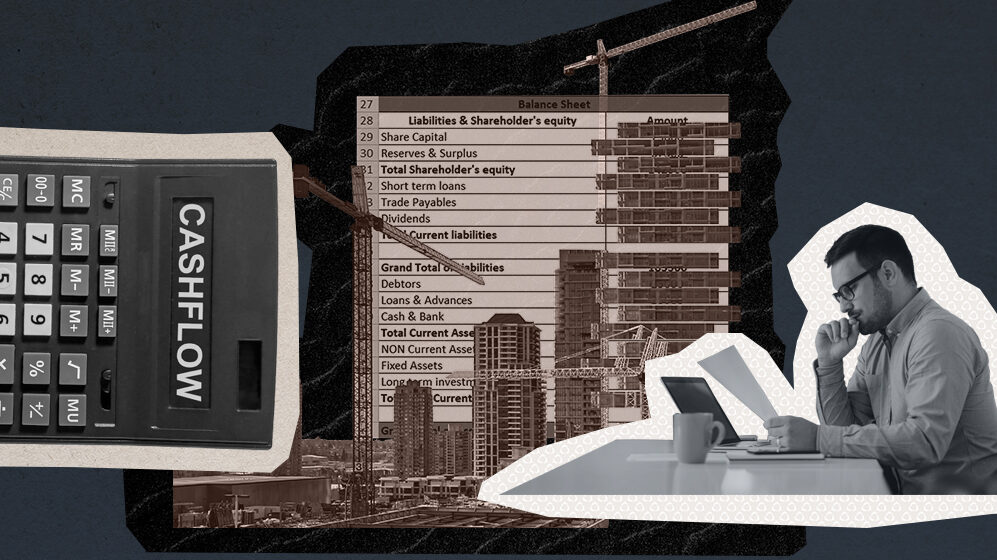Finance and accounting are a big part of success in the construction industry. Allocating costs and managing a complicated cash flow environment requires professional diligence and astute foresight. Fluctuating input prices are particularly prevalent presently, making it even more difficult to project costs and make accurate bids for future projects. As a result, strong, qualified financial help is an absolute essential.
Accounting and Estimation Challenges in Construction
No two construction projects are the same and a meticulous accounting of costs presents a great challenge.
“Construction accounting is different from regular business accounting,” writes construction writer Dawn Killough for Levelset. “In addition to the standard accounts payable, accounts receivable, and payroll transactions, construction companies deal with retention, job costing, change orders, progress billings, customer deposits, and other anomalies. These added facets make construction accounting different and require special processes.”1
Far more than just a legal obligation, proper accounting provides companies with a greater understanding of each completed project’s profitability (or lack thereof). Bidding on future projects, which are often massive in scope and lengthy in duration, should not be done lightly. A thorough comprehension of historical costs must inform this vital process.
Factoring into each project are materials, labour, equipment, administrative, and subcontractor costs. Some of these are directly related to the project at hand, while other expenses must be amortized over the life of several projects. Further complicating accounting efforts are specification changes, sometimes agreed to on the fly with a simple handshake.
Implementing tracking systems which are thorough, yet not cumbersome, will ensure accurate information exists for each project. Careful analysis of this information will help companies gain a better understanding of the types of jobs they are best served bidding on in the future. In this regard, great data and careful study can be the difference between making and losing money.
Cash Flow Management in Construction
Poor bidding, unexpected change orders, and inconsistent pay schedules are just a few of the factors that can cause construction companies to run into cash flow problems. Multiple projects are often happening concurrently and payment may or may not be immediately received at the completion of work. Furthermore, lengthy delays (or worse, bad debt) are possibilities. In fact, ‘chronic lack of payment’ was cited as the industry’s second largest ‘issue of concern’ in a recent survey conducted by the BC Construction Association; the availability of a skilled workforce is number one.2
With this in mind, predicting future monetary needs and managing affairs accordingly becomes another important role of a construction company’s finance and accounting minds.
“Even if a construction business is awarded the contracts, without proper cash management, the company risks putting itself in a tough financial situation,” writes Handle.com CEO Patrick Hogan. “Regulating a project’s finances and addressing the cash flow challenges in the construction industry ensures profitability for the business.”3
Construction Materials See Inflated Costs
If pricing projections are difficult to make during the best of times, they are particularly so in the present environment wherein several input costs are seeing major price increases. Various types of wood and steel products have doubled or even tripled in price and there may be no end in sight.
President of the Electrical Contractors Association of British Columbia (ECABC) Deborah Cahill told Construct Connect, “ECABC’s membership is experiencing both increased prices and a supply shortage. Cost increases vary depending on the material or equipment, but they are happening regularly and are reportedly more than 30 per cent cumulatively.”4
Like many other goods, these materials are being impacted by supply chain complications owing to the Covid-19 pandemic. There has been an increase in demand owing to a construction boom fueled by several factors, including diverted vacation dollars being spent on home improvements, government spending on infrastructure, and low interest rates. Further adding to construction costs are labour shortages and additional safety protocols.4
“Members are varying degrees of optimism whether or not the unpredictable pricing and availability of materials will end in the near future,” continues Cahill. “Some warn that if there isn’t more stability soon, B.C.’s construction market could be adversely impacted, and we could potentially see projects delayed.”4
While some contractors have agreements stipulating an ability to adjust material prices based on market conditions, such clauses are not universal. Those being forced to honour prices quoted under vastly different conditions run the risk of incurring major losses.
Construction companies rely on tireless work from a large and dedicated group in order to get the job done. Not to be forgotten in this effort are the accountants and financial professionals who keep things on track. Recruiting and developing talented individuals for these positions is an important part of success in the construction industry.




